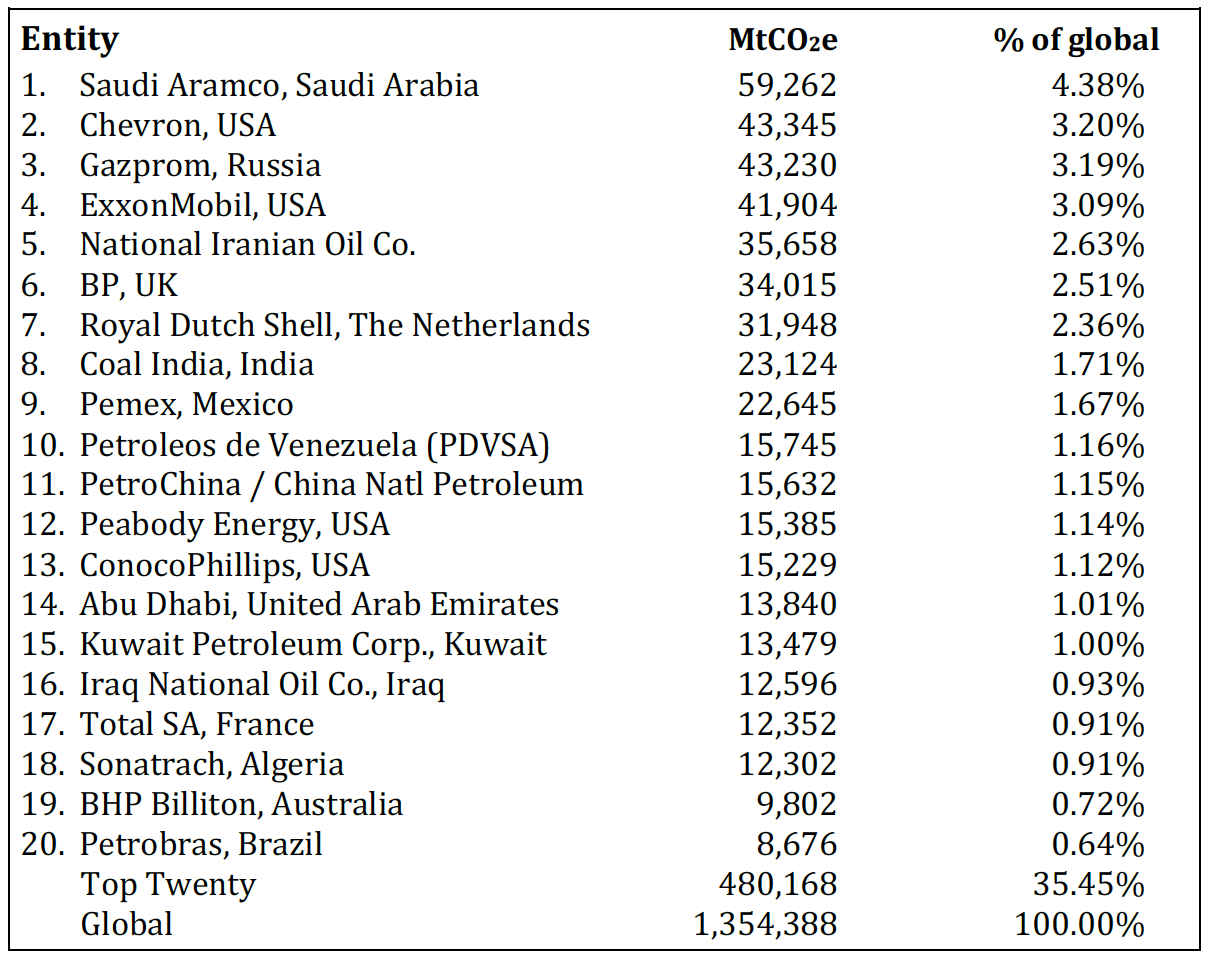It is clear that fossil fuel companies extract, refine, and market the carbon fuels that, when used as intended, contribute 87% of all CO2 from fuels, cement, and land use (and ~62% of all greenhouse gas emissions) that drive atmospheric warming and climate changes.
On the theory that fossil fuel producers bear substantial responsibility for the adverse impacts of their products, the Climate Accountability Institute investigates how much, quantitatively, the largest oil, gas, and coal companies contribute to climate change. In a dataset released in October 2019, we found that the top 20 companies have collectively produced the fuels that led to 480 billion tonnes of carbon dioxide and methane (GtCO2e) being emitted from 1965 to 2017. This amounts to 35% of all global fossil fuel emissions in that time (1.35 trillion tCO2e). The largest contributors include Saudi Aramco, Chevron, Gazprom, ExxonMobil, BP, and Royal Dutch Shell (see table below).
Table 1: Top twenty oil, gas, and coal companies’ emissions for the period 1965 to 2017.

Global fossil fuel and cement emissions are also listed, and company emissions are shown as a percent of global emissions over the same period.
Seven-eighths of emissions attributed to carbon producers is from use of their products—gasoline, diesel, jet fuel, natural gas, and coal—and one-eighth from extracting, refining, and delivering finished fuels.
Oil, natural gas, and coal companies have benefited for decades from hundreds of billions of dollars in government subsidies incentivizing fossil fuel development, as well as regulatory preferences such as lax pollution controls, favorable leasing for resource extraction on public lands, and other taxpayer-funded costs, such as military protection for shipping lanes. Overall, companies are the beneficiaries of what economist Nicholas Stern has called the “greatest market failure the world has seen,” by privatizing the profits and externalizing the costs and damages. We must gradually eliminate subsidies and regulatory preferences, and to price carbon so as to “internalize” the vast costs of climate damages now mostly paid by people who did not cause the problem, such as today’s farmers and tomorrow’s children.
We focus on fossil fuel and cement producers because the industry had early knowledge that their products would destabilize climate, which threaten their business model reliant on continued growth in production and marketing of carbon fuel. They thus bear a moral responsibility to address the impacts caused by the use of their products. But rather than take action to ameliorate the harms, the companies continued to invest in additional production, funded campaigns to disinform the public and delay legislative action, and sought to expand and perpetuate the carbon economy—as if the consequences didn’t matter.
The Climate Accountability Institute was formed in 2011 to do the scientific work needed to confront fossil fuel companies and (we hoped) to leverage their commitment to align future production and emissions with targets embodied in the Paris Agreement and work of the IPCC.
The arc of CAI’s work from attributing emissions to carbon producers, modeling their impact on global climate, publishing scientific papers, and contributing to efforts to hold companies accountable for climate damages, are illustrated in the figure below.

The work has two main tracks:
-
First, source attribution: this involves quantifying emissions attributable to the fossil fuel companies from extraction and processing to transportation, delivery, and combustion, based on the historical production of oil, natural gas, and coal by each entity from as early as the 1860s to our latest update to 2017 (see phases 1 & 2 in the figure above, and Table 1);
-
Second, attribution as a scientific endeavor to model the of climate impacts flowing from the emissions traced to each major carbon producer. These climate models quantify the increase in atmospheric concentration of CO2 and CH4 and the resulting rise in radiative forcing, surface temperatures, sea level and acidification of the world's oceans (see phases 3, 4, 5, and 6 above). Radiative forcing refers to the CO2-enriched atmosphere ‘s lower radiation of infrared heat energy into space. Ocean acidification refers to the absorption of carbon dioxide in the ocean’s surface layers that acidify the waters, which then impacts the building of coral reefs, cause coral bleaching events, decimate critical marine nurseries, and impacts the livelihoods of fisherfolk.
These results are of rising interest to climate litigators, human rights commissions, financial analysts, shareholders, regulators, scientists, and energy and climate activists.
The science of detection and attribution is improving rapidly, and while we can with increasing confidence link emissions to higher degree of risk and higher incidence and degree of damages to human interference with the climate system—the human fingerprint on rising climate damages—it is more challenging to link the emissions traced to individual fossil fuel producers to anthropogenic climate damages. It is not simply a proportional exercise in which each oil, gas, and coal company’s historical emissions (e.g., Chevron’s 3.2% of global CO2 and CH4 emissions since 1965) are used to allocate adaption costs among fossil fuel companies. Furthermore, other parties contribute to emission and thus bear some responsibility for climate change, including individual consumers and corporate emitters, as well as nations, airlines, corporations, and electric utilities, to name a few.
Some entities are more responsible than others, and it is our contention that oil and gas and coal producers bear the preponderance of responsibility, not only for climate damages and sharing the cost of adaption, but also a moral (and perhaps legal) mandate to accelerate decarbonization of the world energy economy. Some companies are reacting positively to this challenge: Repsol, the Spanish oil and gas major, recently committed to net zero emissions by 2050 across its full supply chain, and other majors are moving in that direction, e.g., BP, Royal Dutch Shell, and Equinor.
Carbon emissions must—if we are to preserve global civilization as we know it—decline rapidly toward net zero by mid-century.
In my opinion, this shift is due to multiple contributing factors: reassessment of their fiduciary and social responsibilities, the rise in public awareness, public demonstrations, reputational risk of being laggards, the future cost of government action (such as a substantial carbon tax), investor pressure, and seeing profitability in low-cost renewables.
The writing is on the wall. Carbon emissions must—if we are to preserve global civilization as we know it—decline rapidly toward net zero by mid-century. This requires a massive trillion-tonne transformation of the global energy system, decommissioning of plants, drilling platforms, mines, pipelines, refineries, boilers, vehicles, all manner of carbon infrastructure, and the construction of a new (though less massive) infrastructure to capture, store, transport, and use the emerging renewable energy systems. But it also requires the investment of trillions of dollars, and the deployment of ingenious, efficient new systems. This transition should not only be the burden of the nations of the world, and their taxpayers, but also in substantial part the fossil fuel companies that have willfully prolonged this transformation.
In my view, this transition has been inevitable for decades, we have known this for decades, and we have squandered precious time, skirted our responsibilities, and shifted the costs to our children. Leading fossil fuel companies understand their role and the existential importance of leading the transition to a low-carbon economy. It is my hope that the companies—and countries—that lead will prosper, and that the laggards will get out of the way.

